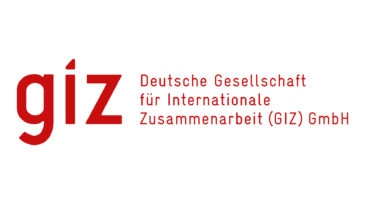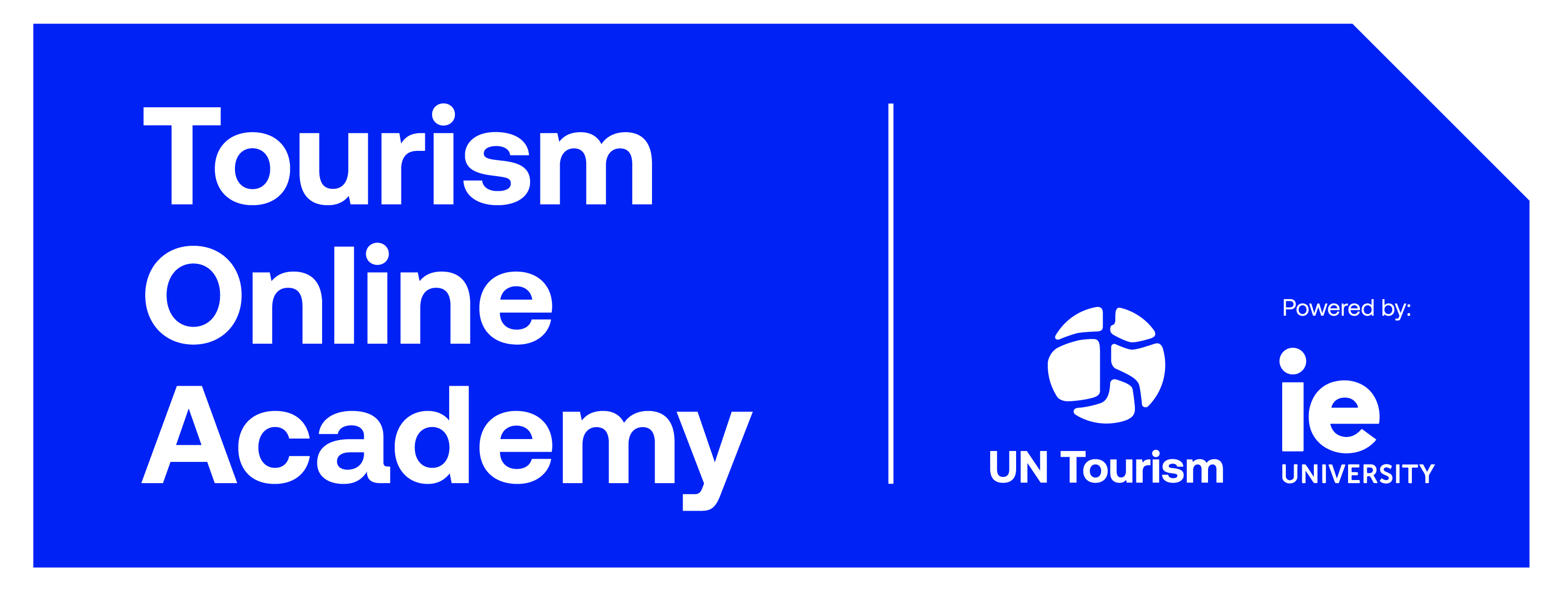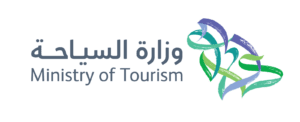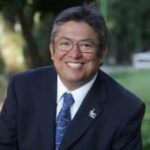
Outside USA: +1‑607‑330‑3200

Sustainable Tourism Destination Management Self-Paced Cornell Course
Course overview.
This course aims to train global hospitality and tourism professionals in using sustainable practices across all areas of the tourism industry. Throughout the course, you will be introduced to innovative, data-driven methods for destination management, delivered by over 20 world-renowned experts in the field. You will begin by identifying the different components that make up the global tourism industry and examine the effects each of these components has on a destination’s social, cultural, and environmental well-being. You will then acquire the tools needed to manage your destination sustainably by designing a climate action plan, documenting and accommodating natural capital needs, improving land-use planning, engaging with local communities, and managing public-private partnerships. Ultimately, you will be able to contribute to the economic development of a destination while also protecting its health.
Key Course Takeaways
- Define the global tourism economy and measure the social and environmental impacts of tourism
- Document water, waste, energy, and natural capital management needs
- Design a climate action plan for your tourism destination
- Track how tourism can support essential economic development goals
- Facilitate an inclusive process where local communities review and protect their own cultural and natural assets
- Transform destination governance by promoting public-private partnerships, data-driven decision making, and innovative financing
- Synthesize sustainable destination management tools by applying them to real-life tourism case studies

Download a Brochure
Strategic partners.

How It Works
Course authors.

- Certificates Authored
Mark Milstein is Clinical Professor of Management and Director of the Center for Sustainable Global Enterprise at the Samuel Curtis Johnson Graduate School of Management, Cornell University. He conducts applied research in and oversees the Center’s work on market and enterprise creation, business development, clean technology commercialization, and sustainable finance.
Dr. Milstein specializes in framing the world’s social and environmental challenges as unmet market needs which can be addressed effectively by the private sector through innovation and entrepreneurship, thereby allowing companies to achieve financial success by creatively addressing problems such as climate change, ecosystem degradation, and poverty. He has received funding from the National Science Foundation, the Bill & Melinda Gates Foundation, the Rockefeller Foundation the S.C. Johnson Foundation, SEvEN, the World Bank, the University of Queensland, and the Water Resources Institute. Over the past decade, Dr. Milstein has worked with more than 100 firms across a range of industries, including renewable energy and carbon markets, life sciences and sustainable agriculture, consumables, food and nutrition, healthcare, tourism and hospitality management, as well as finance and international development.
Dr. Milstein’s work and perspectives have been featured in The New York Times, MSNBC, CNBC, Forbes, The Guardian, and GreenBiz. He is a frequent speaker on the topics of strategy, organizational change, and innovation related to business and sustainability. He also consults with a number of multinational firms, small- and medium-sized enterprises, and NGOs. Dr. Milstein currently serves on the board of directors of Livelihood Basix International and as a board member for Johnson & Johnson’s Earthwards Program.
- Omnichannel Leadership Program
- Sustainable Business
- Food Executive Program

Megan Epler Wood is a leader, educator, and consultant who has dedicated her professional career to the implementation of sustainability practices in the field of tourism. She has worked for over 30 years to inform leaders, students, and business professionals across the globe on the use of well-researched and sustainable business, environmental conservation, and inclusive economic development tools. As program director of the Sustainable Tourism Asset Management Program (STAMP), Ms. Epler Wood seeks to increase collective knowledge and understanding of how to more effectively manage tourism destination assets over time to improve maintenance; ensure proper valuation; and help offset the influences of poverty, ecosystem degradation, climate change, land tenure, and the lack of government investment in vital local infrastructure in underdeveloped economies worldwide.
Who Should Enroll
- Hospitality and tourism professionals
- Business leaders
- Regional and urban planners
- Local, municipal, and national government employees
- Marketing and PR professionals
- Land and marine management professionals
- Economic development professionals
- Civil and systems engineers

What You'll Earn
- Recognition of Achievement from Cornell’s SC Johnson College of Business
- 40 Professional Development Hours (4 CEUs)
Watch the Video
Request information now by completing the form below..
Enter your information to get access to a virtual open house with the eCornell team to get your questions answered live.
Ready to Apply?
Tourism Management, M.S.R.
Develop a comprehensive understanding of travel and prepare to excel in a multi-billion dollar industry with IU Online’s Master of Science in Recreation in Tourism Management. This flexible, online master's degree program enables you to make educated decisions and preparations for tourists, travelers, convention-goers, and more.
- Request Info
Course Delivery : 100% Online
Total Credits : 35
In-State Tuition Per Credit : $518.62
Out-of-State Tuition Per Credit : $621.98
Cost of attendance may vary by campus. View the total cost calculator
Degree Overview
Your M.S.R. in Tourism Management prepares you to utilize new technologies to attract and retain visitors, and learn the ins and outs of sustainability, travel behavior, accessibility, tourism planning and development, and public health. You’ll work with industry-expert faculty and develop connections to launch your exciting career in tourism management.
You’ll graduate with an Indiana University degree respected by employers worldwide—and you can work on yours anytime and anywhere. Plus, you’ll enjoy personalized support services throughout your academic journey.
And the benefits start long before graduation. More than half of IU Online students advance in their careers before they complete their degree.
To be accepted to this program, you must have:
- A bachelor’s degree
To apply to this program, complete an online application that includes:
- Official transcripts
- Three letters of recommendation
- Statement of purpose, 600 words or fewer
- TOEFL or IELTS scores (international applicants only)
Application Dates
Fall semester (priority date): Jan 15
Fall semester: Apr 1
Spring semester: Nov 15
Degree Requirements
NONE LISTED, NEEDED FROM IU ONLINE
Find course descriptions with our Search Schedule of Classes/Courses tool .
Find the answers you need or start your application. We’re here to help!
- Request more information
Apply now link and Social media
- Facebook for IU
- Linkedin for IU
- Twitter for IU
Give Feedback
You are using an outdated browser. Please upgrade your browser to improve your experience.

- Future Students
Current Students
- Apply to UWI
- Programme Search
- Campus Life
- Research & Innovation
- Faculties/Academics
Online Systems
- Student Administration System
- Student Portal
- Bursary Online Student System (BOSS)
- Online Tuition Payment
- Online Transcript Request
- ASKMONA: Library Virtual Reference Service
Student Services
- Office of Student Financing
- Mona Information Technology Services
- Campus Registrar
- Campus Security
- Guild of Students
- Graduate Studies & Research Information Portal
- Health Services
- The Office of Student Services
Registration & Fees
- Undergraduate Fees
- Graduate Fees
- Financial Aid
Online Support
- Password Self Service
- Five Islands
- Global Campus
- St. Augustine
- Business with UWI

The University of the West Indies, Mona

Centre for Hotel and Tourism Management
- About the Centre
- Director's Message
- Academic Staff
- Administrative Staff
- Undergraduate
- House Restaurants
- Greetings from students
- Calendar of Events
- Poetry Corner
- Clubs and Outreach Activities
- Alumni Profiles
- Alumni Contact Information
- The Bahamas
- Transferring to CHTM
- Before you arrive
BSc in Tourism Management Course Structure
Electives Both Hotel Management and Tourism Management students have the opportunity to register for electives in each semester. Electives include:
- Convention Sales, Planning and Management (HOSP3026)
- The Supervisor as a Trainer (MGMT3027)
- Specialty Restaurant (HOSP3030) Nutrition and Diet in Menu Planning (HOSP3031)
- Food and Beverage Management (HOSP3032)
- A Foreign Language - Spanish (HOTL3502)
- A Foreign Language - French (HOTL3503)
- A Foreign Language - German (HOTL3504)
- Events Planning (HOSP3501)
- Institutional and On-Site Food Service Administration (HOSP3503
- Food Safety and Sanitation (HOSP3502)
Internship (MGMT6135)
All students are required to successfully complete two (2) internships, one at the end of the second year and another at the end of the third year. Internships are 12 weeks in duration and may be undertaken locally, regionally or internationally in a hospitality or tourism related entity, private or public, chosen by the student. Students are largely responsible for arranging their internships, subject to approval by the Internship Coordinator. Assistance is available for students through the office of the Internship Coordinator.
Prospective Students
Prospective students seeking general information on the Faculty of Social Sciences undergraduate programmes should visit here . Students will find valuable information regarding academic programmes, the application process, admissions information, facilities on campus, testimonials, frequently asked questions among other critical information. Prospective part-time students, located in The Bahamas, should contact Ms. Kristen Glinton, for guidance with admission requirements and application process for entry into CHTM. Email: [email protected]
Valuable information for current students of CHTM can be found here . Students will find extensive information needed by undergraduate students covering everything from orientation to examinations. The Faculty of Social Sciences Handbooks (2006 - 2011) are available here . Students are expected to adhere to the requirements as at their year of entry into the University.
Emergency Contacts | Campus Contacts | MITS Helpdesk
The University of the West Indies Mona, Jamaica
Tel: (876) 927-1660-9 Fax: (876) 927-2765
- Undergraduate Students
- Graduate Students
- Faculty & Staff
- Mona Business Hub
- Support UWI
- Media Centre
Our 7 faculties and 12 professional schools offer more than 200 programmes to some 18,000 graduate, undergraduate and continuing studies students.
The UWI, Mona ranks first in Jamaica among accredited tertiary-level programmes. In 2012, the University was again one of Jamaica’s Top 100 Employers.
Disclaimer | Privacy Statement

Introduction to Tourism – Industry Management
Description.

Instructors
REGISTRATION
INSTITUTION
This last decade, innovation and technology have irrevocably changed the rules. We have witnessed the birth of a very demanding, multi-channel and self-sufficient digital tourist, who expects personalised customer service and feels the need to be connected on a constant basis. Training is now an essential requirement in order to remain active and relevant in this new scenario, where tourists are more demanding and require real-time information and efficient processes. At the same time, there is so much data available that can be leveraged to provide customers with the best possible experience. This Massive Open Online Course (MOOC) is a great opportunity for anyone who is interested in developing his or her basic knowledge on management concepts applied to the tourism industry.
You can enroll and study the content for free and only pay € 49 if you want to do the assignments and receive a certificate of completion .
What will you learn in this program?
- Different concepts related to strategy and its implications in tourism: Competitive strategy, competitive advantage and corporate strategy.
- Basic concepts and tools on financial accounting and its mechanics.
- Big data and its importance in the travel sector.
- The importance of operations management in business financial performance and sustainability in the tourism industry.
- Digital transformation and innovation for the tourism industry.
- How marketing is changing and what tools you can use under the domain of digital marketing.
WHO IS THIS PROGRAM DESIGNED FOR?
This program is suitable for professionals and individuals seeking to learn introductory concepts and expand their knowledge on tourism industry management.
Whether you are growing in your company (or any other company), or are undertaking a venture as an entrepreneur in the tourism industry you need to have a minimum of management knowledge to add value in your position or to lead your business.
This is achieved through a 100% online training course with short videos with professors, readings, exercises and assignments in each module.
PROGRAM STRUCTURE
This Massive Open Online Course has an estimated duration of between 8 to 10 hours. We recommend at least two hours per week of study time to allow you to cover all of the content in four weeks.
The format is 100% flexible as the MOOC has been designed to follow a self-paced methodology. It has been divided into five sections, each developing basic concepts of the core management areas: Strategy, finance, digital marketing, operations management and digital transformation and innovation.
At the end of the course, and if you have enrolled paying the fee, you will have access to an assessment. If you approve this test, you will get the MOOC certificate from the Tourism Online Academy.

Alvaro Carrillo de Albornoz
Professor of Strategy
He is an executive with a broad experience related with innovation management, and projects in energy and tourist sectors. Besides, wide experience in organizational and strategy matters. Nowadays he is a Managing Director at Instituto Tecnológico Hotelero - ITH.

Kevin Sigliano
Professor of Marketing
A managing partner at Good Rebels, and a professor at IE Business School. He has over 15 years of experience working in management consulting firms, including PWC Consulting and IBM BCS. As an entrepreneur, Kevin has launched numerous startups; over the last 10 years, he has been involved in the international development of smart cities and the digital signage company, Admira.com.

Virginia Bombín
Professor of Finance
She is a Finance Professor at both IE Business School and Financial Times IE Corporate Learning Alliance. She also enjoys participating in business projects leading the financial planning as well as assessing the financial well-being of companies.

Professor of Operations Management
He holds a PhD in Manufacturing Management and Engineering, University of Toledo, Ohio (USA). He has gained a number of teaching awards and is welcomed as a visiting professor at universities in countries such as Mexico, Belgium, France, China, Colombia, Guatemala, El Salvador, Costa Rica, Nicaragua, Spain and the US.

Konstantina Valogianni
Professor of Innovation&Technologies
She is a Professor in Information Systems at IE Business School - IE University. She is teaching graduate level courses related to Technology and Innovation, as well as Digital Transformation. Prof. Valogianni holds a PhD in Information Systems from Rotterdam School of Management, during which she specialized in designing machine learning algorithms for sustainability, and specifically electric vehicle charging. She is the recipient of several impact awards and EU grants for her work in designing machine learning algorithms. Her work has appeared in journals and conference proceedings.
Enrollment process
Click on Enroll once and then click on checkout/view cart.
Add to cart
If you would like to obtain a certificate of completion, please enroll in Get Certified: Introduction to Tourism-Industry Managemen t after finishing the MOOC.
Request more information
If you would like to enroll multiple users or need more information about this course, please contact us!
Student life
Start Studying Online Today!
Want to study from the comfort of your own home?
- IIE Faculty of Commerce
- IIE Faculty of Finance & Accounting
- IIE Faculty of Law
- IIE Faculty of Education
- IIE Faculty of Humanities and Social Science
- IIE Faculty of Information and Communications Technology
Find a qualification best suited to you
Course Type
- IIE Diploma
- IIE Higher Certificate
- IIE Postgraduate Qualifications
New Study Mode
- Distance with Tuition Support
International Certifications
Qualifications
Explore all qualifications
You can pay your fees online
- Bloemfontein
- Braamfontein
- Nelson Mandela Bay
- Mbombela (Nelspruit)
- Pietermaritzburg
- Pretoria CBD
IIE Faculties
IIE Qualifications
2024 Admissions
Cookie Usage
We use cookies to give you the best possible browsing experience. By continuing to browse this website you agree to the terms outlined in our Privacy Notice. To find out more click here
IIE Diploma in Tourism Management
This qualification provides learners with focused knowledge of the fundamental elements of the discipline of tourism management.

The purpose of this IIE Diploma in Tourism Management is to equip learners with the relevant theoretical and industry knowledge and competencies that will enable learners to manage a team or department successfully and responsibly within a tourism organisation and/or establish a tourism venture.
- Nelson Mandela Bay
Course Outline
Face-to-face: This is a three-year full-time qualification offered by The Independent Institute of Education (The IIE) at IIE Rosebank College. Face-to-face lectures take place during the day on weekdays at the following campuses: Braamfontein, Cape Town, Durban, Polokwane, Bloemfontein, Nelson Mandela Bay and Pretoria CBD.
Distance (Online): This IIE qualification is available through IIE Distance Learning for individuals wanting to study and work. You can receive Online support from IIE Rosebank College. Speak to one of our student advisors for more information.
Digital and Academic Literacies
Tourism Management 1A
Tourism Marketing 1A
Introduction to Quantitative Thinking and Techniques
Tourism Marketing 1B
Tourism Development 1
Events Management
Tourism Management 1B
Tourism Development 2A
Tourism Management 2A
Tourism Marketing 2A
Introduction to Accounting and Finance
Communicative Languages: IsiZulu / IsiXhosa
Tourism Management 2B: Tourism Entrepreneurship
Tourism Marketing 2B
Work Integrated Learning 1
Tourism Legislation
Sustainable Tourism Development
Tourism Management 3A: Strategic Tourism Management
Strategic Tourism Marketing 3A
Niche Tourism
Tourism Management 3B Strategic Tourism Management
Work Integrated Learning 2
Strategic Tourism Marketing 3B
Admission Requirements
Minimum Admission Requirements
Senate Discretionary Admissions
Mature Age Exemption
Candidates must have attempted the Senior Certificate or equivalent, attained the age of 23 before or during the first year of registration with three years' work experience and proven ability relating to the proposed programme as well as adequate communication skills; OR Candidates must have attained the age of 45 before or during the first year of registration.
Recognition of Prior Learning (RPL)
Where candidates do not satisfy the formal admission requirements for this qualification, The IIE may consider an admission application in terms of the Credit Accumulation and Transfer, Recognition of Prior Learning and Qualification Completion Policy (IIE010).
USAf approved cognate foundation programme
Candidates who have completed an USAf approved cognate foundation programme from a registered and accredited provider may be admitted.
Transfer students
Candidates who have successfully completed at least 120 credits on the first year of a cognate 3- year diploma may be admitted. However, if a student completed less than 120 credits, the admission criteria on the NSC or equivalent or higher certificate or advanced certificate apply.
OQSF qualifications
Candidates with an OQSF Level 5 cognate qualification may be admitted, provided the OQSF qualification has at least 120 credits at NQF Level 5.
Important Information
- To be awarded this qualification, a minimum final year mark of 50% for each module must be achieved.
We've got your back!
All our IIE Rosebank College registered students get free software. The software includes and is not limited to MS Excel, MS Project, MS Word, MS PowerPoint and MS Outlook, which come with Office 365 bundle. Students can access the software online using their RCCONNECT email addresses on office 365 or visit the campus IT Department to get FTP access to download the software.
DEVICE REQUIREMENTS To get the best out of the blended learning experience, you will need the following minimum requirements: a computer or laptop with WI-FI, Windows 10 or higher, Intel Pentium 4 Processor or Higher, 1 gigahertz (GHz) or faster processor or a System on a Chip (SoC), 1 gigabyte (GB) for 32-bit or 2 GB for 64-bit (Or Higher) for your RAM, 16 GB for 32-bit OS 32 GB for 64-bit OS (or Higher) Hard Drive space, DirectX 9 or later with WDDM 1.0 driver for your Graphics card, and a Screen Resolution of a minimum 1280 x 800
NB: this fact sheet is accurate at the time of publication. The Independent Institute of Education (The IIE) reserves the right to alter any of the content prior to commencement of registration due to changes in regulation, policy, market requirements or any other valid reason.
- 2024 FULL-TIME FEES
- 2024 BLENDED CAMPUS FEES
- 2024 DISTANCE FEES
FULL SETTLEMENT Due 28 Feb
TOTAL CASH FEE per ANNUM
11 MONTHLY INSTALLMENTS 1st instalment due 28 Feb
TOTAL TERM FEE per ANNUM
CASH FEE per Module
Deposit per module
5 x monthly instalments
TERMS FEE per module
Course Accreditation
The IIE Diploma in Travel is accredited by the Council on Higher Education (CHE) and is registered by the South African Qualifications Authority (SAQA) on the National Qualifications Framework (NQF) as a 360-credit qualification on Level 6 (SAQA ID No: 118172 ). On successful completion, you will receive a Diploma in Tourism Management from The Independent Institute of Education (The IIE), a leading registered private provider of higher education in South Africa.
The Independent Institute of Education (THE IIE) offers you the opportunity to start with a higher certificate and progress into a diploma or degree. There are several pathways offered by The IIE at IIE Rosebank College, that enable access to higher-level qualifications.
Speak to the student advisor for more information.
Qualification Overview
Study Options
Online & Campus
Call Me Back
- Select a Study Mode
- Blended Learning
- Select Preferred Campus
- Study Online
- Port Elizabeth

Aeorion SMS

Search form
Tourism & hospitality management.
- Apply Online
- Corporate Education Department
- UCC Academy
- UCC Foundation
- UCC Partnerships Division
TOURISM & HOSPITALITY MANAGEMENT
The Bachelor of Science degree in Tourism and Hospitality Management has a strong business related base of core courses, with specialised courses throughout the programme, that are focused on the critical needs of the Tourism and Hospitality Industry globally.
The Bachelor’s degree in Tourism & Hospitality Management is aimed at attracting a target market for the development of management skills, that will serve the tourism and hospitality industry globally. Graduates will also be able to matriculate to a Master’s Degree programme offered through UCC or other tertiary institutions
The programme will enhance professional skills for the following candidates:
- Industry (In-service) aspiring and current Supervisors and Managers,
- Special Audience - Civil Service Managers in front facing roles,
- School Leavers - With a passion for engagement in the tourism and hospitality sector, in administrative, operations and marketing functions,
- Entrepreneurs - With the drive to create and manage tourism and hospitality related ventures.
The programme will be offered in the ‘blended’ and ‘online’ modalities, thereby catering to students locally and internationally.
Modality 1: Fully Online with Supervised Internships
Content Curriculum will be delivered Online via a combination of synchronous and asynchronous modules. Simulation/virtual labs will support content learning in courses. The programme will utilise content Modules, observational, and project-based learning assessments.
In-service (paid or unpaid) Internships for two semesters (one midpoint and one final year) will provide supervised experiential practice for students. These Internships will be supported by online theoretical instruction and seminars.
Modality 2: Blended with Supervised Internships
A portion of the content curriculum courses in the programme will be delivered face-to-face, in-person at campus locations, while other courses within the programme will be offered Online synchronous and/or asynchronous. Industry Simulations/ Virtual Labs will support student learning. The programme will utilise Mid-Semester and End-of-Semester summative assessments of the content curriculum, observational, and project-based learning assessments.
Internships for two semesters (one midpoint and one final year) will provide supervised experiential practice for students. These Internships will be supported by online theoretical instruction and seminars.
INTERNSHIPS:
Upon completion of both internships, students would have gained practical hands-on experience through real world application within the field of Tourism and Hospitality Management. The UCC Tourism and Hospitality Department has strong relationships with industry partners, to ensure that impactful internships are achieved, thereby improving the confidence, skills, and competitive advantage of our students in the global labour market.
PROGRAMME LEARNING OUTCOMES (PLOs)
At the end of the Bachelor’s degree programme, students should be prepared to:
- Hotel General Manager/Villa Manager
- Guest Relations Manager
- Marketing Manager
- Entertainment/Events Manager
- Food & Beverage Manager
- Spa Manager
- Tourism Linkages Development Manager
UCC Bachelor of Science degree programmes are four-year programmes. This may be reduced by up to two years, if a student gains Advanced Standing with an appropriate Associate of Science degree or equivalent qualification.
The University of the Commonwealth Caribbean (UCC) is registered with and recognized by the University Council of Jamaica (UCJ) as a University College with the authority to offer academic degrees up to the Masters level. The University of the Commonwealth Caribbean has also been granted institutional accreditation by the University Council of Jamaica, effective November 11, 2019. Students who successfully complete a UCC academic degree are assured of graduating from an excellent academic programme, provided by an institutionally accredited institution, which will be accepted anywhere in the world.

- Tuition & Fees
- Short Courses
- Associate Degrees
- Undergraduate Programmes
- Graduate Programmes
- 100% Online Programmes »
- Online Micro-Credentials »
- Accelerated MBA »
- Our Campuses
Business & Management Programmes
- Logistics Operations & Management (LOM)
- Production and Operations Management
- Tourism & Hospitality Management
- Tourism & Hospitality Management (ASc.)
- Business Administration (ASc.)
- all programmes...
Register to study through Unisa
- Subjects & modules
- All subjects
TOURISM MANAGEMENT
Tourism Management: Major combinations for BCom: NQF Level: 5: TRT1502, MNB1501, MNB1601 NQF Level: 6: TRT1602, TRT2601, MNG2601, MNM2615 NQF Level: 7: TRT3701, TRT3702, TRT3703, TRT3705 Tourism Management: Major combinations for the Diploma: NQF Level: 5: DTM1501, TRT1502 NQF Level: 6: TRT1602, DTM2601, DTM2603, DTM2604, DTM2605, DTM3605 and DTM3609 NQF Level: 7: DTM3701, DTM3703, DTM3704 & TRT3702
First time to EOPCW?
- +251921035701
- [email protected]
- Opening: 12:00am - 12:00am
Sustainable Tourism Management Course OutLine
- Sustainable Tourism Management
- Course OutLine
Course Descrpiton
Course name:sustainable tourism management by tesfaye fentaw ; course code: tohm2051.
The course covers historical development, nature and scope, economic dimension, socio-cultural dimension, environmental dimension, key actors in sustainable tourism; tools of sustainability; functional management, concept of carrying capacity, role of government and different sectors of sustainable tourism. The level of sustainability of different types of tourism activities will be analyzed and different case studies will be given to students to enhance their knowledge and skill of the course.
Welcome to the United Nations

New 10-Year Plan offers lifeline to small islands developing states
Get monthly e-newsletter.

In May 2024, Small Island Developing States (SIDS) convened in Antigua and Barbuda and received renewed commitments from the United Nations, international partners, and the global community to address their unique development challenges.
1. Build resilient economies:
- Enhance inter-island and global supply chain connectivity.
- Promote science, technology, innovation, and digitalization to drive economic growth.
- Strengthen data collection, analysis, and capacity building for evidence-informed policymaking.
- Establish a SIDS Center of Excellence in Antigua and Barbuda, including a SIDS Data Hub, a technology and innovation mechanism, and an Island Investment Forum.
- Expand productive capacities and increase trade and investment opportunities.
- Promote sustainable tourism and ocean-based economies through public-private partnerships and innovative financing solutions.
2. Foster safe, healthy, and prosperous societies:
- Promote peaceful, inclusive societies and build effective institutions.
- Address poverty, unemployment, inequality, and exclusion, particularly among vulnerable populations.
- Strengthen health systems and social protection, focusing on communicable and non-communicable diseases (NCDs) and improving health literacy.
- Achieve gender equality, empower women and youth, and ensure inclusive participation and representation in decision-making processes.
3. Secure a sustainable future:
- Foster sustainable energy transitions and improve access to renewable energy.
- Develop integrated water resources management and enhance climate resilience to water-related hazards.
- Enhance food security through climate-resilient agricultural practices and sustainable fisheries management.
- Build resilient infrastructure to support economic growth and improve living conditions.
4. Environmental protection and planetary sustainability:
- Take urgent action on climate change through the effective implementation of the UNFCCC and the Paris Agreement.
- Conserve and sustainably use marine and terrestrial biodiversity.
- Mainstream disaster risk reduction through improved governance, infrastructure resilience, and early warning systems.
The Antigua and Barbuda Agenda for SIDS (ABAS) – a Renewed Declaration for Resilient Prosperity
Due to their small size, geographical remoteness, dispersed populations, and limited economic diversification, SIDS are particularly vulnerable to external shocks, climate change, and natural disasters. The recently concluded UN Conference on SIDS charted a new course to tackle these challenges.

African SIDS
The ABAS holds promise for African SIDS, including Cabo Verde, Comoros, Guinea-Bissau, Mauritius, Sao Tome and Principe, and Seychelles.
These nations face significant hurdles, including the compounded impacts of the global financial crisis, the COVID-19 pandemic, and the ongoing climate crisis. Despite contributing less than 1% of global carbon dioxide emissions, they are on the frontlines of climate change, experiencing severe consequences such as sea-level rise, extreme weather events, and biodiversity loss.
As the ABAS outlines a comprehensive framework designed to address those unique challenges, African SIDS have an opportunity to take advantage of targeted interventions to foster sustainable development and shore up their resilience.
Improved inter-island and global supply chain connectivity will reduce transportation costs, facilitating trade and economic integration. This is particularly beneficial for countries with dispersed island territories, enhancing their access to regional and international markets.
Support for renewable energy projects will help achieve ambitious energy targets, reducing reliance on imported fuels and promoting energy security. Coupled with promoting sustainable tourism, these measures will diversify economies, create jobs, and enhance environmental protection. Countries with vibrant tourism sectors stand to benefit significantly from these initiatives.
Improvements in healthcare access and capacity building for health emergencies will enhance the resilience of health systems. Strengthening disaster preparedness and early warning systems will mitigate the impacts of natural disasters, crucial for nations prone to extreme weather events.
Investments in advanced technologies and the digital economy will reduce dependency on traditional sectors, fostering economic diversification. Strengthening institutional and technical capacity for data collection and policy implementation will enhance governance and enable better decision-making.
Climate-resilient agricultural practices and food security initiatives will improve livelihoods and reduce vulnerability. This is vital for nations where agriculture plays a significant role in the economy, ensuring food security and sustainable livelihoods.
Support for sustainable fisheries, marine tourism, and ocean-based renewable energy will boost the blue economy. Strengthened marine protected areas and sustainable fisheries management will support marine biodiversity, benefiting nations with extensive coastal and marine resources.
Investment in resilient infrastructure , particularly in transportation and water management , will support economic growth and improve living conditions. This will be especially beneficial for countries facing infrastructural challenges, enhancing their capacity to withstand and recover from external shocks.
Looking Ahead
The SIDS4 Conference has set the stage for the Summit of the Future, scheduled to take place at UN Headquarters in New York from September 22-23, 2024. This summit will be a critical moment to renew multilateralism and ensure that the most vulnerable countries, including African SIDS, have access to the finance and technology needed to support the Sustainable Development Goals.
Also in this issue

Protecting Africa's wetlands is key to combating biodiversity loss

Angola: Soyo entrepreneurs switching from oil to sustainable agriculture

Africa’s Economic Sovereignty: The time is now for African-Led Solutions

The duality of the education challenge in Africa: Historical imperatives and 21st-century necessities

Colonel Léa Yangongo: Inspiring women to join and thrive in the military in the Central African Republic

New revenue streams: Using Africa’s vast renewable energy and natural resources for premium carbon credits

Amplifying the message of peace through poetry

Unregulated Autonomous Weapons Systems pose risk to Africa

In Southern Africa, El Niño drought leaves a trail of scorched harvests and hunger

Racheal’s resolve: Championing disability rights in Uganda

Guiding the Future: UN launches new panel on critical energy transition minerals
- Request Info
- Bachelor's Degrees
- Master's Degrees
- Ph.D. & Doctoral Degrees
- Grad Certificates
- Professional Ed
- Undergraduate Minors, Certificates, & Training
- Professional Development & Training
- Credit Courses
- Noncredit Courses
- All-University Core Curriculum
- Free Online Courses
- Osher Lifelong Learning Institute
- Professional Ed d
- Contact Us d

Select one of the options below:
Tourism Management M.T.M.
CSU's online master's in tourism management helps you develop your business management acumen, enhance your knowledge of industry practices, and understand the social and environmental impacts of global tourism — so you can live the lifestyle you love while working to create positive experiences for others.
Gain the advanced skills to thrive in an evolving industry
Global events, an evolving market, and new technology have all changed the way people engage in tourism activities. As a result, more consumers now seek regional experiences with greater personalization and a focus on sustainable, meaningful, and authentic experiences.
Start building the industry-specific knowledge you need to become a well-rounded leader in a tourism management role.
Learn a whole-system approach
Gain foundational skills as you study a holistic, integrated approach to sustainable tourism management. Explore technological and strategic business solutions that can help you operate a more agile, streamlined operation. Investigate the social and environmental impacts of this evolving industry as you learn to balance the ethical treatment of people and resources while running a profitable venture.
Throughout this master’s program, you will learn:
- Financial management processes and tools
- Effective marketing and communication strategies
- How to use data to gain insight and guide business decisions
- How to strategically and ethically manage both people and resources
Inspired by exploring the outdoors or regional cultures? Looking to align who you are with what you do? Tourism offers many options for shifting into a new career or advancing into a management role within the industry.
Build the specialized skills to make a meaningful impact on the world while doing something you love.
Gain a competitive career advantage with employers specializing in:
- Hospitality and resort management
- Outdoor and adventure travel
- Tourism management
- Destination management or marketing
- Event management
- Cruise management
- Agritourism
Start your own tourism venture
Our graduates have established roles in a variety of tourism settings all over the country and world. Some examples are numerous hotels, City Parks and Recreation Departments, and more specifically – Beaver Creek Resorts, The Cliff Lodge – Snowbird, Visit Fort Collins, Vail Resorts, U.S. Forest Service, Into the Vineyard - Wine-Inspired Travel, Adventure Sixty North, Natural Habitat Adventures, Colorado Forest Restoration Institute, Yellowstone Campgrounds, Cruise Norway, Steamboat Spring Chamber of Commerce, Universal Studios Beijing, and Taiwan Ministry of Tourism.
Graduates work in tourism positions relating to marketing, operations, event planning, and some have even founded their own companies. This program has helped students enter the tourism industry, as well as elevate their career if they were already in the tourism field.
"My online learning experience with CSU was amazing. All the professors were amazing and got back to me in a timely manner. They are so knowledgeable, helpful, and kind. They answered all my questions. I’m grateful to be part of this community."

Current role : Founder, Adumu Safaris
"The Tourism Management program at CSU significantly elevated my expertise in sustainable tourism and adventure travel and expanded my network of social entrepreneurs. With this knowledge, I established Adumu Safaris, a socially responsible safari tour company aimed at empowering my Maasai tribe in Tanzania through community-accountable ecotourism. CSU's training equipped me with leadership, finance, and sustainable tourism skills, which I now use to create transformative journeys for travelers."

Caroline R.
"My graduate program at CSU has been instrumental in my current position, where I oversee multiple departments within a hotel/lodge. The ski area management certification and M.T.M. skills I gained are vital in running a successful resort. Learning about resort finances, creating memorable guest experiences, and fostering guest loyalty have been invaluable. Connecting with professors, like skiing with one at Snowbird, provided valuable insights. My advice to current and prospective students: Engage with professors to gain informative career guidance. CSU's program equipped me with the knowledge and tools necessary for success in my industry, particularly in hotel operations and finance."
As a student in CSU’s online tourism management master’s program, you receive the same education, learn from the same faculty, and earn the same regionally accredited degree as students on campus. Additionally, you can expect:
- The Ability to Graduate in Less than a Year: In just nine months you can earn an industry-specific master’s degree that helps set you apart when seeking employment or advancement in the tourism industry.
- A Focus on People and the Planet: Learn to provide meaningful travel experiences for clients while making business decisions grounded in sustainability and social responsibility. Explore the types and extent of tourism impacts on natural resources. Discover methods for reducing the ecological footprint of tourism activities and destinations. Learn how to increase tourism's contribution to natural resource conservation while improving human welfare in the process.
- Preparation in Fact-Based Decision-Making: This program incorporates courses in global tourism policy (NRRT 662) and two courses in quantitative analysis (NRRT 601 and 602) to equip you with the knowledge needed to make smart, meaningful business decisions driven by data.

Alan Bright, Ph.D.
Alan's teaching responsibilities include on-campus and distance coursework for the M.T.M. program and courses in the natural resource tourism program. Alan's primary research interests center around theoretical applications of social psychological constructs toward the management of natural resources, including values, attitudes, behavior, and the complexity with which people think about issues. These constructs are also considered in the context of attitude and behavior change. Alan's teaching interests focus on development and administration of coursework in the tourism undergraduate and graduate programs.

Christina T. Cavaliere, Ph.D.
Cavaliere is an environmental social scientist with a focus on linking tourism and biocultural conservation. Her areas of research involve the human dimensions of socio-ecological systems including tourism impacts. She serves as an Assistant Professor of Human Dimensions of Natural Resources in the Warner College of Natural Resources at Colorado State University in Fort Collins, Colorado. Dr. Cavaliere investigates aspects of sustainability and climate change impacts related to gender, conservation, aviation, wildlife, and governance. View Dr. Cavaliere’s full bio .

Stuart Cottrell, Ph.D.
Stuart teaches courses in ecotourism, sustainable tourism development, protected area management, and research in human dimensions of natural resources. His research focus includes sustainable tourism, travel and tourism behavior, visitor impact management, and public perceptions of landscape disturbance issues. Present projects involve a National Science Foundation grant to examine land management agency and water provider perception of pine beetle impacts on water quality. As a former resident fellow with the School for Global and Environmental Sustainability, Stuart conducted a preliminary study of the impacts of mountain pine beetle infestation on recreation and tourism, which led to the present NSF project. One of the highlights of Stuart's teaching involves the monitoring of diseased corals and volunteer based conservation projects for an NGO in the Bahamas.

David Knight, Ph.D.
David has developed a unique transnational skill-set in sustainability and tourism management living and working in the U.S., Spain, the Philippines, Peru, and China. Drawing from experience as director, educator, researcher, consultant, collaborator, and confidant, David’s growing university-level leadership underscores his passion for partnerships and diversity in working with real-world organizations and communities to provide tangible, experiential learning opportunities for students. His research and consulting projects for organizations operating from local to international levels have analyzed a variety of sustainability and tourism issues pertaining to National Parks, Chinese tourist behavior, marine protected areas, and rural (e.g., Machu Picchu) community development. Ultimately, David hopes to employ his experience, compassion, and intellect to support institutions of higher learning in empowering diverse communities through exceptional outreach, student recruitment/retention, advising, teaching, and research activities.

Mike Manfredo, Ph.D. Head
Michael’s research focus is on understanding human thought about wildlife and natural resources. The goals of his current research program are: to increase the availability of human dimensions information relevant to wildlife and natural resource management; to provide for increased understanding of the role of human dimensions information in natural resources decision-making; to facilitate the integration of human dimension information into the natural resource decision-making process.

Dr. Sarah Walker
Dr. Sarah Walker’s research uses an environmental justice lens to investigate the role well-being can play in helping us better understand people’s relationships with their environments. Specifically , she studies human well-being in the context of climate resilience and adaptation in vulnerable communities around the world. Her work also investigates the well-being benefits of spending time in nature. Sarah received her PhD from Colorado State University and is currently completing her post-doctoral training at University of Colorado Boulder. She’s an avid hiker and cyclist, and loves being in the classroom with students.

Lina Xiong, Ph.D.
Lina Xiong is an assistant professor in the Department of Human Dimensions of Natural Resources. She is also called "Dr. Bear," because her last name in Chinese means bear. Dr. Bear came to the U.S. in 2006 from mainland China. Lina completed her Ph.D. in Business Administration from Temple University in Philadelphia. Before coming to CSU, Dr. Bear had taught many business courses in the College of Business at Marshall University. Her teaching assignment at CSU includes tourism strategic management, tourism marketing, and advanced lodging in the Master of Tourism Management program. She is also responsible for developing several M.T.M. courses in mandarin. Dr. Bear's research interests include service management, internal branding, employee brand motivation, and customer loyalty. She has published several articles in hospitality management journals. Recently, Dr. Bear's dissertation, titled, "Employee Brand Internalization: The Central Route to a Brand Aligned Workforce," has received a Highly Commended Award of the 2014 Emerald/EFMD Outstanding Doctoral Research Awards in the Hospitality Management category. This is a prestigious international annual award presented by Emerald and the European Foundation for Management Development (EFMD). She has worked in hospitality and tourism businesses in both China and the U.S.
What is tourism management?
Tourism management is a field of study that explores the theory and practice of creating, overseeing, and marketing tourism ventures. Management professionals in the tourism industry typically require skills in leadership, finance, and business operations. The online tourism management program offered by CSU has a unique focus on natural resource management and tourism policy.
What can I do with a degree in tourism management?
As the industry continues to evolve, there are many new and unique opportunities for professionals with an advanced tourism management degree. Graduates of the online Master of Tourism Management program will be qualified to work in fields that include: hospitality and resort management, outdoor and adventure travel, event management, agri-tourism, ecotourism, and more. Anyone intending to create their own tourism enterprise will also benefit from completing this program.
Why study tourism management?
There are numerous rewarding career opportunities in the tourism industry for people with the right skills. In the U.S. alone, tourism supports more than 15 million jobs and generates nearly $2 trillion in economic output, according to the U.S. Travel Association. Working in this industry is often appealing to individuals with a passion for travel, exploration, adventure, and the outdoor lifestyle. The primary goal of tourism ventures is to provide customers and clients with positive experiences.
What jobs can I get with a tourism management degree?
Graduates of the tourism management master’s program gain the managerial skills to create entrepreneurial ventures, or take leadership roles in the industry. Career opportunities in tourism management range from agri-tourism to hospitality and resort management. Students gain the skills to build careers as tourism program directors, event coordinators, sales managers, account executives, marketing managers, customer experience managers, and many others.
What is the average salary for hospitality and tourism?
Salaries vary widely in the hospitality and tourism industry depending on the specific job, region, and other factors. According to Glassdoor, the average annual salary (U.S.) for a tourism marketing manager is $80,673, and the average salary for a hotel manager is $59,461. The median annual salary for a resort manager is $46,342, according to PayScale.com.
What is sustainable tourism management? What is ecotourism management?
Sustainable tourism management is an approach to the business of tourism that values the environment and social responsibility as much as profit. Ecotourism is a subset of sustainable tourism that primarily focuses on exotic, remote, and/or threatened natural areas such as rainforests, coral reefs, and other fragile ecosystems. The typical goal of ecotourism is to promote the conservation of these areas by helping tourists experience them while creating minimal or no environmental impact. A portion of profits from some ecotourism ventures may also be used to help fund various conservation efforts.
Can I get a graduate certificates along with this master’s degree?
Yes. You can apply up to 12 credits of the Communication for Conservation certificate toward the Master of Tourism Management degree.
What is the average timeframe to complete the program?
The online Master of Tourism Management can be completed in two semesters. However, for students who are working full-time, this is likely an unrealistic timeframe. The average student completes the program in two years, but some students may take longer. The flexible, online program allows you to earn your degree at a pace that suits your lifestyle and goals.
Are summer classes an option?
No. All coursework in the program is during the fall and spring semesters.
What fees should I expect to pay in addition to tuition?
In addition to the tuition, students will pay a $32/semester technology fee. There will also be an added cost for books and texts.
The Master of Tourism Management requires completion of 30 credits, with a minimum of four elective credits.
All courses are eight weeks with some courses offered the first part of a semester and others in the second part of a semester. Please work with a Program Coordinator to determine your approved course plan:
Kathryn Metzger Program Coordinator, Tourism Enterprise Program (970) 491-7617 [email protected]
Linda Sawyers Program Coordinator, Tourism Enterprise Program (970) 491-7592 [email protected]
M.T.M. Curriculum
Fall semester: first 8-week session.
- NRRT 600 – Tourism Industry Concepts and Practices (2 cr.)
- NRRT 620 – Organizational Management in Tourism (2 cr.)
- NRRT 655 – Tourism Marketing Concepts and Applications (2 cr.)
- NRRT 679A – Current Topics in Nature-Based Tourism (1 cr.)
Fall Semester: Second 8-week Session
- NRRT 608 – Nature, Outdoor Recreation - Human Well-Being (2 cr.)
- NRRT 615 – Sustainable Tourism Development Foundations (2 cr.)
- NRRT 650 – Financial Management in Tourism (2 cr.)
- NRRT 679B – Current Topics in Nature-Based Tourism (1 cr.)
Spring Semester: First 8-week Session
- NRRT 601 – Quantitative Analysis in Tourism I (2 cr.)
- NRRT 677 – Project Management and Event Planning (2 cr.)
- NRRT 671 – Strategic Management for Travel and Tourism (2 cr.)
- NRRT 567 – Tourism Entrepreneurship (2 cr.)
Spring Semester: Second 8-week Session
- NRRT 609 – Tourism and Conservation (2 cr.)
- NRRT 625 – Communication/Conflict Management in Tourism (2 cr.)
- NRRT 678 – Tourism Leadership (2 cr.)
- NRRT 667 – Applied Experiential Learning in Tourism (2 cr.)
Elective Options:
Students can take the electives listed below or other electives may be approved by an advisor.
You may substitute some of the M.T.M. courses with electives from the Communication for Conservation graduate certificate program.
The are some additional options, such as RRM 520 – Lodging Management , available as well. Please contact your Program Coordinator to determine your approved course plan.
Application Deadlines
Start your application online and upload materials directly into the online system. You can save your progress and return any time.
Applications are reviewed once they are completed. You can expect to be notified of your application status within two weeks of submitting all application materials.
1 Review Admission Requirements
The tourism management master's degree requires that students have the following:
- Bachelor's degree from a regionally-accredited institution.
- A 3.0 GPA on all undergraduate coursework. For applicants who do not meet the 3.000 cumulative GPA requirement, this is an alternative admission pathway. Applicants can gain formal admission if they have a cumulative GPA between 2.800 and 3.000 or have a cumulative GPA below 2.800 and have taken six credits of regular, graduate‐level coursework (500 level or higher) at CSU and obtain a B or better in all courses.
- GRE scores are not required.
2 Prepare Application Materials
- A Statement of Purpose essay describing how this program aligns with your goals and why you’re applying for this degree.
- Your Resume or Curriculum Vitae (CV).
- Two letters of recommendation (generally from professional or academic references).
- One transcript from EACH university attended (if previous course work has been completed at Colorado State University-Fort Collins, transcripts are not required).
Please Note: Students may be unconditionally admitted and registered in their first semester of courses with an unofficial transcript. Official transcripts must be submitted, prior to or during your first semester, before you can register for your second semester of graduate work. Failure to meet this condition will result in your dismissal from the Graduate School.
- Digital Transcripts must be submitted by the originating institution using a secure service such as parchment, eScrip-Safe, the National Student Clearinghouse, or e-Quals. Transcripts received via e-mail are considered unofficial. Use institution code 4075 for Colorado State University or [email protected] if the secure service requires an email address.
- Graduate Admissions
- Colorado State University - Office of Admissions
- 1062 Campus Delivery
- Fort Collins, CO 80523-1062
3 Complete Online Application
Complete the online graduate application and pay the nonrefundable application processing fee (payable online). As soon as you have completed the required information, please submit your application. Your application will not be reviewed until it is complete and all required materials have been received.
- Select "Tourism Management (M.T.M.) – Distance" when choosing the program of study.
4 Request Official Transcripts
Request one official transcript of all collegiate work completed from all institutions attended. Transcripts from Colorado State University are not required. Transcripts must be received directly from the originating institution to be considered official.
Electronic (preferred): Digital Transcripts must be submitted by the originating institution using a secure service such as parchment, eScrip-Safe, the National Student Clearinghouse, or e-Quals. Transcripts received via emails are considered unofficial. Use institution code 4075 for Colorado State University or [email protected] if the secure service requires an email address.
Mail (if necessary) Graduate Admissions Colorado State University – Office of Admissions 1062 Campus Delivery Fort Collins, CO 80523-1062
Check Your Application Status
View your application status at any time to ensure your application checklist is complete or to check on updates.
For International Applicants
Proof of English language proficiency is required for applicants from countries or United States territories where there are official languages other than (or in addition to) English. This includes the U.S. territories of American Samoa, Guam, the Northern Mariana Islands, and Puerto Rico.
Learn more about English language proficiency requirements .
We love learning about your goals and answering any questions you have.

Program Details
- 3.0 GPA on all undergraduate coursework
- Math Entrance Exam scores recommended for applicants who have not taken the required prerequisites within the past 10 years
Application Dates
Request information.
By providing your information, you consent to receive calls, emails, and/or text messages from CSU Online. Consent not required to purchase goods or services. For more info, call 1-970-491-5288 . We respect your privacy . This site is protected by reCAPTCHA and the Google Privacy Policy and Terms of Service apply.
- Accreditation
- Dates & Deadlines
- Faculty & Staff Resources
- Classroom Locations
- p (970) 491-5288
- e 2545 Research Blvd. Fort Collins, CO 80526
- Privacy Information
- State Authorization Disclaimer
- Equal Opportunity

COMMENTS
Course Outline for: BUSN 1157 Introduction to Hospitality and Tourism Management. Course Description: Number of credits: 4. Lecture hours per week: 4. Prerequisites: None. Corequisites: None. MnTC Goals: None. The tourism industry is one of the world's largest, and fastest growing industries. Through assigned readings, research, discussions ...
Description: Introduces travel and tourism from local to international levels. Covers the scale, scope and organization of the industry. Emphasizes the development and management of natural, cultural, heritage and recreational resources of tourism. Identifies issues related to the economic, technological and political aspects of tourism.
Course Overview. This course aims to train global hospitality and tourism professionals in using sustainable practices across all areas of the tourism industry. Throughout the course, you will be introduced to innovative, data-driven methods for destination management, delivered by over 20 world-renowned experts in the field.
BUILD YOUR MOMENTUM WITH OUR CURRICULUM. Experience the 100% online, instructor-led Master of Science in Tourism and Hospitality Management. Designed for busy professionals or those just getting started in their careers, this program offers a convenient format that allows you to earn your degree and apply what you learn in the classroom to your current and future work environments.
Explore online tourism management courses and more. Develop new skills to advance your career with edX.
This flexible, online master's degree program enables you to make educated decisions and preparations for tourists, travelers, convention-goers, and more. Apply Now. Request Info. Course Delivery: 100% Online. Total Credits: 35. In-State Tuition Per Credit: $518.62. Out-of-State Tuition Per Credit: $621.98. Cost of attendance may vary by campus.
Tourism management is a field of study that explores the theory and practice of creating, overseeing, and marketing tourism ventures. Management professionals in the tourism industry typically require skills in leadership, finance, and business operations. The online tourism management program offered by CSU has a unique focus on natural ...
Program Information: This is a required course for the Tourism Management Certificate/Diploma program and will be of interest as an elective for students in business management. Delivery: This course may be delivered in both face-to-face and online formats. COTR Credits: 3. Hours for this course: 45 hours . Typical Structure of Instructional Hours:
In summary, here are 10 of our most popular tourism courses. Sustainable Tourism - promoting environmental public health: University of Copenhagen. Sustainable high-end tourism: Universitat Autònoma de Barcelona. Hospitality Luxury Brand Management: Starweaver. Hotel Management: Distribution, Revenue and Demand Management: ESSEC Business School.
Tourism is a key economic driver for our rural communities and helps to diversify business in many of our larger destinations. The career opportunities are literally endless! The diploma gives you the knowledge and skills to confidently step into positions of supervisory and leadership when opportunities are available.
The Master of Science in Tourism, Hospitality and Event Management (MSTHEM) program at the GW School of Business, which can be completed on a full-time or part-time basis, produces the industry's next great leaders by combining classroom and field-based learning with exceptional access to jobs, internships, and networking and career ...
BSc in Tourism Management Course Structure. Year 2. Semester I. Semester II. Hotel Information Systems (HOTL2112) Organizational Behaviour (MGMT2008) Principles and Practices of Hospitality Marketing (HOSP2016) Hospitality Human Resources (HOSP2023)/td>. International Travel and Tourism (TOUR3020)
This Massive Open Online Course (MOOC) is a great opportunity for anyone who is interested in developing his or her basic knowledge on management concepts applied to the tourism industry. You can enroll and study the content for free and only pay € 49 if you want to do the assignments and receive a certificate of completion.
Tourism is a top Canadian industry - 20 million travellers annually choose Canada. In BC, tourism is a $15 billion industry - close to 20,000 tourism-related businesses are operating in BC. There are more jobs available than job-seekers - since 2013/14, the demand for workers in the BC tourism industry has significantly exceeded supply.
This programme concentrates on broad coverage of tourism industry that includes computerized fares and ticketing, event management, park and recreation, e-tourism, human resources, sales and marketing, and professional development. Served by qualified lecturers with PhDs and Masters in Tourism, this programme prepares the graduates a wide array ...
Course Outline for: BUSN 2097 Internship in Hospitality and Tourism Management A. Course Description 1. Number of credits: 2-4 credits 2. Internship hours per week: Variable (45 hours per credit) ... in hospitality and tourism. D. Course Learning Outcomes: Upon successful completion of the course, the student will be able to: 1. Discuss the ...
Explore the IIE Diploma in Tourism Management at Rosebank College. Gain insights into tourism operations and management. Start your journey in the tourism industry. ... Course Outline. Face-to-face: This is a three-year full-time qualification offered by The Independent Institute of Education (The IIE) at IIE Rosebank College. Face-to-face ...
Home » University Courses » Diploma in Tourism Management. ... Programme Name: Diploma in Tourism Management Programme Code: D34TMQ. Medium of Facilitation: Full-Time NQF Level: 6 NQF Credits: 372 SAQA: 96993. Application Start Date: 1 April 2024 Application End Date: 31 October 2024. Campus: Auckland Park Bunting Road.
University of the Commonwealth Caribbean. Delivery Modality: Blended/Online. The Bachelor of Science degree in Tourism and Hospitality Management has a strong business related base of core courses, with specialised courses throughout the programme, that are focused on the critical needs of the Tourism and Hospitality Industry globally.
Tourism Development IIB - DTM2604; Diploma: Semester module: NQF level: 6: Credits: 12: Module presented in English: Module presented online: Recommendation: TRT1602 or DTM1604 Purpose: The purpose of the module is to equip students with a detailed knowledge of tourism planning and sustainable development and management of tourism attractions.Students will have insight into the role of tourism ...
This free online course aims to help develop your management skills in the travel and tourism sectors of the hospitality industry. By taking this course, you will become familiar with several new technologies and sustainable development strategies to maximise your career opportunities. COURSE PUBLISHER -. Start Course Now.
Available Lessons: 114. Average Lesson Length: 8 min. New lessons are still being added. Watch a preview: chapter 1 / lesson 1. Hospitality Industry | Definition, Fields & Services. Hospitality ...
The course covers historical development, nature and scope, economic dimension, socio-cultural dimension, environmental dimension, key actors in sustainable tourism; tools of sustainability; functional management, concept of carrying capacity, role of government and different sectors of sustainable tourism. The level of sustainability of ...
Support for sustainable fisheries, marine tourism, and ocean-based renewable energy will boost the blue economy. Strengthened marine protected areas and sustainable fisheries management will ...
Tourism management is a field of study that explores the theory and practice of creating, overseeing, and marketing tourism ventures. Management professionals in the tourism industry typically require skills in leadership, finance, and business operations. The online tourism management program offered by CSU has a unique focus on natural ...